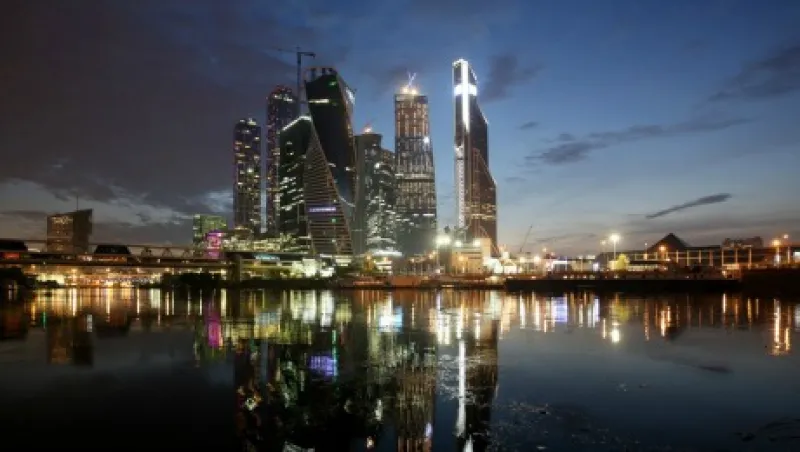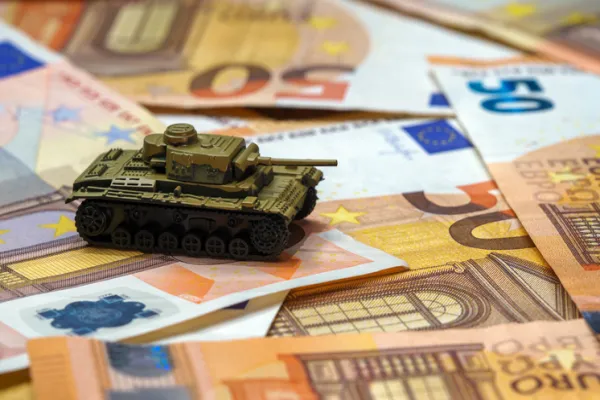Russia’s asset management industry has struggled to gain traction even at the best of times. These are far from the best of times.
President Vladimir Putin’s escalating confrontation with the West over Ukraine, combined with an economy slowing to stall speed, has spooked the foreign investors who own most of the free float in Russian equities. The Moscow Exchange’s MICEX index was down 5.5 percent this year, as of August 28, compared with an 8.4 percent rise for the MSCI Emerging Markets index. A $75 billion wave of Ukraine-related capital flight in the first half of the year obliged the Central Bank of Russia to raise its key interest rate by 250 basis points, to 8 percent, to protect a plummeting ruble. That pushed up bank deposit rates to more than 10 percent, further diminishing the attractiveness of securities investments.
The recent trends have dealt a setback to a market that was already struggling with structural weaknesses. Post-Communist Russia had just managed to sow the seeds of a shareholder culture when the country’s default and financial crisis in 1998 triggered a stock market meltdown. Today most savers prefer the perceived safety, and high yields, of simple bank deposits. Institutional investors such as corporate pension funds and insurance companies have been slow to develop. And the country’s burgeoning class of high-net-worth individuals tends to send its money abroad, explaining the hundreds of billions of dollars in capital flight since the Soviet Union disintegrated in the early 1990s.
It’s hardly surprising then that firms in the Russia 20, Institutional Investor’s exclusive annual ranking of the country’s largest asset managers, report collective assets of just $57.8 billion.
Managers received more bad news last month when the government let it be known that a one-year moratorium on contributions to nonstate pension funds, which was announced in late 2013, will be extended at least through the end of 2015.
Until the beginning of this year, Russian workers could divert up to half of their mandatory pension contribution, or 3 percent of salary, to privately managed pension funds rather than the state system. These private funds swelled sevenfold between 2010 and the end of 2013, to 1.1 trillion rubles ($30 billion), providing asset managers with their prime engine of growth.
Late last year the Finance Ministry announced it was suspending contributions to nonstate pension plans on the grounds that fund regulation needed to be tightened. Some fund managers fear the government’s next step could be to permanently ban such contributions. Although the Finance Ministry has made no formal announcement, Labor Minister Maxim Topilin, an avowed enemy of the nonstate pension system, recently told the Izvestia newspaper that legislation to abolish the partial shift of mandatory contributions to private pension plans would be presented to the Duma this fall.
The mood among Russian money managers is understandably subdued. “For the foreseeable future, I don’t see anything good happening in this business,” says Sergey Grigoryan, chief investment officer at UralSib Asset Management, which falls four places in the ranking to No. 13, with assets plunging by more than half, to $1.24 billion at the end of June.
Others in the industry prefer to accentuate the positive. Vladimir Potapov, chief executive at VTB Capital Investment Management, a unit of state-owned VTB bank, which rises to the top of the ranking with $7.3 billion in assets, says interest rate hikes create attractive returns in ruble-denominated fixed income. Russia’s benchmark domestic sovereign bond, which matures in 2027, yields about 9.6 percent, whereas blue-chip corporate paper pays as much as 12 percent. “The Russian credit story is very straightforward,” Potapov says. “There are good opportunities in securities again relative to bank deposits.”
Although the Russian state and its largest companies look financially impregnable, investors in local bonds run the risks of either ruble devaluation or further central bank rate increases. Potapov believes the ruble, which fell by 12.7 percent against the dollar between the end of 2013 and September 2, is relatively safe going forward, but that is largely because the CBR is willing to tighten again to defend the currency and check inflation. VTB Capital expects consumer price inflation to run at a rate of 7–8 percent this year, above the central bank’s target of 5 percent.
Potapov says VTB’s asset management unit has had moderate success this year in luring foreign investors into the Russian market. The company has attracted $250 million from outside the country this year, into both fixed income and equity. It plans to launch a long-short equity fund targeted at international investors by the end of this year. “Russia has become a special case for a certain class of investor who sees the opportunity,” Potapov comments.
Aylin Suntay, a Turkish financier who moved to Russia to head up No. 3 Gazprombank Asset Management, finds comfort in the rise of endowments for universities and cultural institutions across the country. From a standing start in 2007, endowment assets have swelled to some 26 billion rubles as the nation’s oligarchs use them to show social commitment or simple fealty to their old school. Russia’s richest man, Alisher Usmanov, and No. 8 Vladimir Potanin both sit on the endowment board of their alma mater, the Moscow State Institute of International Relations, or MGIMO. Billionaire No. 3, Viktor Vekselberg, recently founded an endowment for the Jewish Museum and Tolerance Center in Moscow.
Suntay also sees some positive signs in the regulatory outlook. Sergey Shvetsov, the central bank deputy chairman who assumed oversight of the Russian securities industry last year, is an outspoken supporter of private pension plans. He called on market professionals to “join in the battle” for their preservation at a conference in May. “The assets of the pension system are the basic source of long money for the economy,” he stated.
Although economic liberals are losing out to supporters of state-driven development within the government, they are still working in subtler ways to boost the asset management industry, Suntay contends. Shvetsov is phasing out a rule that forbids pension funds to lose money in any calendar year, a stipulation that effectively restricts them to investing in government bonds and a few other ultraconservative instruments. He is also putting more pressure on large employers, like Russian Railways and Gazprom, to open management of their corporate pension funds to competitive bids rather than funneling them to an in-house vehicle. It is one of the peculiarities of Russian finance that Gazprombank Asset Management never controlled any Gazprom pension money until 2013, Suntay explains, because the energy giant had its own proprietary manager, called Leader. Now the firm scraps for mandates alongside its market competitors, she says.
For Prosperity Capital Management, the largest investor of foreign money in Russian equities and No. 8 in the Russia 20, the good news is that Russia’s international reputation can hardly get worse, and may improve once the dust from the Ukraine conflict settles, bringing the market a substantial peace dividend, says Mattias Westman, Prosperity’s London-based co-founder.
Westman, who worked in Swedish military intelligence before moving to Russia in the early 1990s, has reverted periodically to his old profession since Ukraine erupted in February. He has made fact-finding trips to Crimea and the Donbass war zone in eastern Ukraine to “explain to people what is really happening.” Less contentiously, he points out that Russian companies have been raising dividends steadily in recent years, making the stock market something of a paradise for yields as share prices fall. Russian issuers offered an average dividend yield of 4.5 percent at the end of 2013, compared with an average of 3 percent for global emerging markets, according to VTB Capital, and the difference can only have widened since then.
Prosperity’s energetic against-the-grain defense of Russia has enabled it to hang on to most of its investors, if not attract many new ones. Assets under management actually increased by 3.7 percent, to $3.7 billion, in the year to June 30, although the Moscow Exchange’s dollar-denominated RTS index rose by 9.3 percent during that period.
In another country, an asset management industry with few immediate growth prospects might be ripe for consolidation. But in Russia the leading players’ ties to larger groups and to the state make that unlikely. Four of the top seven asset managers are controlled by state entities. In addition to VTB Capital, these include seventh-ranked Sberbank Asset Management, an arm of the country’s biggest bank; No. 2 TransFinGroup Asset Management, a unit of Russian Railways; and No. 3 Gazprombank, which is controlled by the pension fund of oil and gas giant Gazprom. In addition, sixth-ranked Region Group has close ties to state oil giant Rosneft. • •






